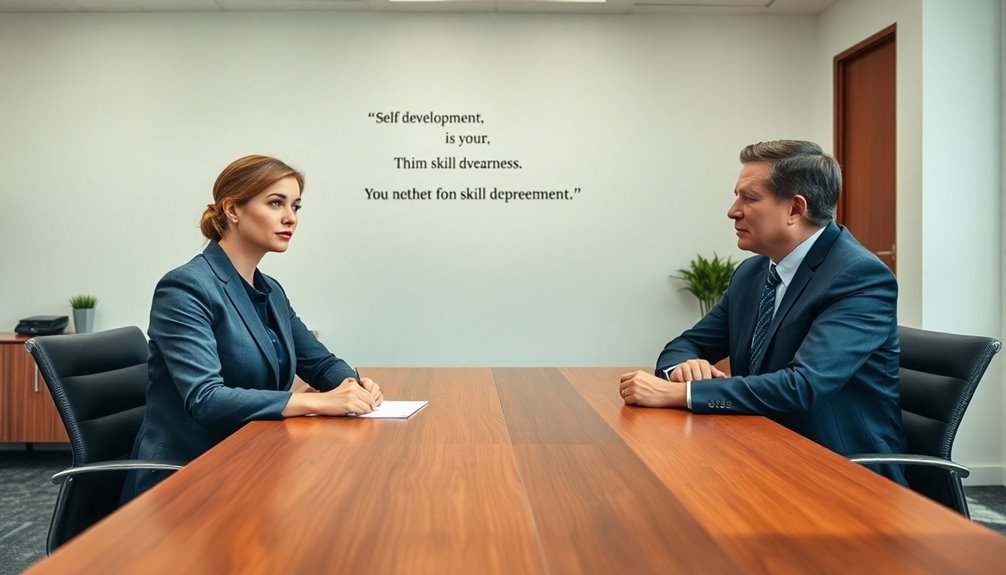When you're asked about your weaknesses in a job interview, it's your chance to show self-awareness and a desire to grow. Pick 2-3 manageable weaknesses that relate to the job, like limited software experience or time management issues. Share specific examples and highlight your improvement strategies, such as taking online courses or joining a public speaking group. Be honest and avoid clichés, as authenticity builds trust with the interviewer. Remember, framing weaknesses as growth opportunities demonstrates maturity and resilience. There's plenty more to explore about crafting effective responses and maximizing your interview success.
Key Takeaways
- Choose relevant weaknesses that align with the job role and reflect on past experiences demonstrating growth and self-awareness.
- Utilize the STAR method to structure your responses, focusing on specific examples and actionable improvement strategies.
- Highlight specific steps taken for improvement, such as attending workshops or seeking mentorship to enhance skills.
- Avoid clichés and excessive self-criticism; instead, frame weaknesses as opportunities for growth and learning.
- Emphasize resilience by sharing lessons learned from past challenges and the commitment to continuous self-improvement.
Understanding the Weakness Inquiry

In the job interview arena, the weakness inquiry serves as a significant moment for both candidates and employers. When you face this question, it's your chance to showcase your self-awareness and honesty. Acknowledging your weaknesses reflects maturity, signaling to interviewers that you're willing to engage in self-reflection. Employers value candidates who understand their limitations and actively seek personal growth.
To make a lasting impression, it's essential to provide specific examples of your weaknesses along with actionable improvement strategies. This approach not only highlights your proactive attitude but also demonstrates your commitment to professional development. Remember to choose weaknesses that are realistic and non-critical to the job role; this guarantees you don't undermine your suitability for the position.
When you discuss your weaknesses authentically, you enhance your credibility and build trust with interviewers. Transparency and integrity are key to fostering a positive connection. Ultimately, understanding the weakness inquiry allows you to navigate job interviews with confidence, positioning yourself as a candidate who's not afraid to learn and improve, making you a more appealing choice for potential employers. Additionally, reflecting on your past mistakes can foster resilience and enhance personal growth, which is vital in your professional journey.
Importance of Self-Awareness

Self-awareness plays a pivotal role in how you present yourself during job interviews. When you recognize your strengths and weaknesses, you demonstrate a commitment to improvement that employers highly value. Acknowledging your weaknesses shows maturity and integrity, indicating you're honest about your limitations and are open to growth.
Self-aware candidates often engage in personal and professional growth, making them attractive prospects. Research suggests that individuals with self-awareness perform better in their roles because they can adjust their behaviors based on their understanding of their capabilities. This adaptability can set you apart in a competitive job market.
Employers appreciate candidates who can articulate their weaknesses and outline the proactive steps they're taking to improve. This approach reflects a dedication to continuous learning and constructive feedback, traits that are essential for success in any role. By showcasing your self-awareness, you're not just highlighting areas for improvement; you're also signaling your readiness to evolve and grow within the organization. Ultimately, this level of self-reflection can enhance your professional growth and increase your chances of landing the job you want.
Common Pitfalls to Avoid

During job interviews, it's crucial to navigate the conversation about weaknesses wisely. One of the common pitfalls to avoid is using clichés like "I'm a perfectionist." These responses can feel insincere and don't provide real insights into your weaknesses in a job. Instead, focus on presenting a genuine weakness that you can discuss.
Another trap is mentioning irrelevant weaknesses that don't pertain to the job role. This can confuse interviewers about your suitability and distract from your qualifications. Also, steer clear of excessive self-criticism. While it's good to acknowledge areas for improvement, being overly harsh can undermine your confidence and raise concerns about your reliability.
Generic answers lack depth, so always aim to provide specific examples. This not only shows authenticity but also demonstrates self-awareness. Finally, be cautious about excessive honesty; acknowledging too many weaknesses can lead interviewers to doubt your ability to handle job responsibilities effectively. By avoiding these pitfalls, you can present a thoughtful and balanced view of your weaknesses, positioning yourself as a strong candidate.
Strategies for Effective Responses

When you're discussing weaknesses in a job interview, honesty and self-awareness are key. You should share specific examples of how you've worked on these weaknesses, steering clear of clichés that can make you seem insincere. By framing your responses effectively, you can showcase your commitment to growth and improvement.
Honesty and Self-Awareness
Acknowledging your weaknesses in a job interview can be a game-changer, as it showcases your honesty and integrity. Demonstrating self-awareness and a commitment to personal growth not only highlights your introspection but also indicates your ability to evolve in a professional setting. When you openly share your personal weaknesses, you foster trust with potential employers.
To effectively convey your weaknesses, focus on authenticity in your responses. Avoid clichés and instead reflect on feedback from past experiences. This approach allows you to articulate your weaknesses more clearly and shows your commitment to continuous improvement. For instance, if you struggled with time management, you might explain how you recognized this issue and sought advice, implemented new strategies, and monitored your progress.
Specific Examples and Improvement
Providing specific examples of your weaknesses not only makes your responses more relatable but also illustrates your proactive approach to improvement. For instance, if you struggle with a specific software relevant to the job, mention it directly. You could say, "I've limited experience with Adobe Creative Suite. To address this, I've enrolled in online training courses and dedicated time each week to practice." This shows self-awareness and your commitment to growth.
Utilize the STAR method to structure your response effectively. Describe a situation where this weakness impacted your work, the tasks involved, the actions you took, and the positive results achieved. By doing so, you highlight not just the weakness but also the steps you're taking to improve.
Focus on realistic and manageable weaknesses, such as challenges with time management or public speaking. Mention how you regularly seek constructive criticism or use productivity tools to enhance your skills. This approach demonstrates a proactive attitude towards personal development, showcasing that you're actively working to overcome your weaknesses while remaining open to learning and adapting in your career.
Avoiding Clichés and Irrelevancies
Avoiding clichés and irrelevant weaknesses is essential for making a strong impression during job interviews. Clichéd responses like "I'm a perfectionist" can seem insincere and fail to showcase your self-awareness. Instead, focus on relevant weaknesses that pertain to the job role. Highlighting irrelevant weaknesses can confuse interviewers about your suitability, so choose wisely.
When discussing your weaknesses, provide specific examples that demonstrate your self-reflection. For instance, instead of saying you struggle with time management, you might say, "I sometimes find it challenging to prioritize tasks. I've started using a task management app to improve my organization." This response shows proactive steps toward personal growth.
Moreover, maintain clarity and conciseness in your answers. Lengthy or overly detailed explanations can detract from your message's effectiveness. Aim to communicate your weaknesses in a straightforward manner, ensuring the interviewer can easily grasp your points. Remember, active listening during the interview can also enhance your communication and connection with the interviewer.
Identifying Relevant Weaknesses

Identifying relevant weaknesses in a job interview can considerably enhance your credibility. Instead of focusing on personal traits, hone in on professional skills. This approach keeps your answer relevant and shows you're self-aware. Here are three areas for improvement you might consider:
- Limited software experience: If you haven't worked with specific tools required for the job, admit it. Highlight your willingness to learn and how you're actively working on it.
- Communication skills: If public speaking isn't your strong suit, acknowledge it. Discuss how you've taken steps to improve, like joining a local speaking group or seeking feedback from colleagues.
- Time management: If you sometimes struggle with prioritizing tasks, it's okay to mention. Share how you're adapting by implementing planning tools or techniques to better manage your workload.
Examples of Weaknesses

When preparing for a job interview, it's crucial to think about specific weaknesses that genuinely reflect your professional development. Here are some common weaknesses to discuss in interviews, framed positively with strategies for improvement:
| Weakness | Strategy for Improvement |
|---|---|
| Impatience | Practicing patience through mindfulness techniques. |
| Disorganization | Utilizing project management tools to stay organized. |
| Difficulty Delegating | Taking a workshop on effective delegation skills. |
| Lack of Confidence | Engaging in public speaking courses to build self-assurance. |
| Time Management Issues | Implementing time-blocking techniques to enhance productivity. |
When you recognize weaknesses like poor technical skills or limited experience, it demonstrates a genuine desire to learn. By actively addressing weaknesses and providing concrete examples of past situations where these weaknesses impacted your work, you enhance your credibility. For instance, mentioning how disorganization affected a project and what you learned from that experience shows growth. Remember to avoid clichés; focus on genuine, relevant weaknesses that don't detract from your suitability for the role. Embracing a mindset of continuous learning is essential for overcoming weaknesses and fostering personal development.
Turning Weaknesses Into Strengths

Turning weaknesses into strengths is a powerful strategy that can set you apart in a job interview. Acknowledging weaknesses shows self-awareness, and framing them as growth opportunities demonstrates a proactive attitude. Here are three key ways to transform your weaknesses into strengths:
- Link Weaknesses to Positive Traits: For example, if you struggle with impatience, highlight how it drives your productivity and efficiency. Show that you channel this trait into meeting deadlines.
- Commit to Personal Development: Provide specific examples of how you've addressed your weaknesses, like enrolling in courses or seeking mentorship. This reflects your commitment to continuous learning and improvement.
- Emphasize Resilience: Discuss how you've learned from your weaknesses and used those lessons to enhance your performance. Employers value candidates who display resilience and adaptability in the face of challenges. Additionally, consider practicing self-reflection to identify areas for further growth and development.
Highlighting Self-Improvement Efforts

Highlighting your self-improvement efforts can greatly enhance your job interview narrative. When discussing weaknesses, it's crucial to pair them with specific actions you've taken to improve. This proactive approach demonstrates self-awareness and a commitment to growth. For instance, if time management has been a challenge, share how you enrolled in productivity courses or started using tools that helped refine your skills.
Concrete examples showcase your dedication to personal development and continuous learning. Employers appreciate candidates who actively seek out workshops or mentorship opportunities to enhance their professional abilities. By illustrating your journey of improvement, you not only highlight your adaptability but also convey a growth mindset.
Additionally, using tools like journaling for self-discovery can help in tracking your progress and reflecting on your growth. Linking past weaknesses to future aspirations can strengthen your narrative, showing that you're not just aware of your limitations but are actively working on improving them. Improvement shows you're willing to learn and grow, which is a trait many employers value. So, when asked about your weaknesses, don't shy away from discussing them. Instead, focus on how you've turned them into opportunities for self-improvement, showcasing your proactive approach to personal and professional development.
Techniques for Skill Development

Building on your commitment to self-improvement, there are various techniques for skill development that can further enhance your capabilities. By focusing on continuous learning, you can address your weaknesses and bolster your strengths. Here are three effective techniques:
- Online Courses: Enroll in online courses or certifications that target specific skills relevant to your job. This not only enhances your technical abilities but also demonstrates your dedication to personal development.
- Productivity Tools: Utilize productivity tools like time management apps to streamline your workflows. These tools can improve your organizational skills, helping you manage workloads more efficiently and reducing stress.
- Mentorship: Seek mentorship from experienced colleagues. This relationship encourages knowledge sharing and provides constructive feedback, which is essential for your growth. Engaging in online communities can also provide additional support and resources for skill development.
Incorporating self-reflection into your routine allows you to evaluate your progress regularly. By setting achievable personal development goals, you'll foster sustained improvement in your skillset over time. Embracing these techniques can greatly elevate your capabilities and prepare you for future challenges in your career.
Preparing for Interview Questions

When preparing for interview questions about your weaknesses, start by identifying realistic ones that relate to the job. Next, think about strategies you've used to improve in those areas, as this shows you're committed to personal growth. Practicing your responses will help you communicate your weaknesses and improvement plans clearly during the interview.
Identify Your Weaknesses
Identifying your weaknesses is a vital step in preparing for job interviews, as it reveals your self-awareness and willingness to grow. By being honest about your limitations, you can show potential employers that you're committed to personal development. Here are three steps to help you identify your weaknesses effectively:
- Reflect on Past Experiences: Think about times when you faced challenges. What skills or traits held you back? This can help you pinpoint relatable weaknesses.
- Align with the Job Role: Focus on professional-related weaknesses that are relevant to the position you're applying for. This could include specific technical skills or soft skills like communication and teamwork.
- Prepare to Discuss Improvement: Be ready to talk about the steps you're taking to address these weaknesses. This proactive approach demonstrates your commitment to growth and improvement.
When discussing weaknesses in a common job interview, limit yourself to two or three manageable ones. Use specific examples from your past to illustrate your progress, showing that you're not only aware of your weaknesses but actively working to overcome them.
Develop Improvement Strategies
Once you've pinpointed your weaknesses, it's time to develop improvement strategies that showcase your proactive approach to personal growth. Focus on specific, actionable steps that demonstrate your commitment to skill enhancement. Use the STAR method (Situation, Task, Action, Result) to frame your responses, providing clear examples of how you've worked to overcome weaknesses in real-life situations.
Here's a table to help you structure your improvement strategies:
| Weakness | Improvement Strategy |
|---|---|
| Time Management | Attend a workshop on prioritization |
| Public Speaking | Join a local Toastmasters club |
| Technical Skills | Enroll in an online course |
Highlight the resources and tools you've utilized, such as workshops or mentoring. Tailor your improvement strategies to align with the job requirements, showcasing how your growth in specific areas can benefit the organization. Finally, practice articulating your improvement strategies clearly and confidently, ensuring you're prepared to discuss weaknesses during the interview. This proactive approach not only reflects your commitment to personal development but also positions you as a candidate keen to grow and contribute.
The Role of Authenticity

Authenticity plays an essential role in job interviews, as it fosters trust and relatability between candidates and interviewers. When you present genuine weaknesses, hiring managers perceive you as honest and self-aware. This connection is vital in making a strong impression. Here are three ways to illustrate authenticity in your responses:
- Acknowledge your weaknesses: Be open about areas where you struggle. This shows self-awareness and helps build rapport with the interviewer.
- Share actionable steps: Discuss the proactive attitude you've taken to address your weaknesses. Highlight specific strategies or skills you're developing to improve.
- Emphasize personal growth: Frame your weaknesses as opportunities for growth. This illustrates maturity and a commitment to self-improvement, which hiring managers value. Additionally, demonstrating your willingness to learn from experiences can enhance your personal motivation and resilience in the workplace.
Key Takeaways for Success

In a job interview, highlighting your self-awareness is key to making a positive impression. By showcasing specific strategies for improvement, you demonstrate your commitment to growth and development. This approach not only builds trust with employers but also sets you apart as a proactive candidate.
Emphasize Self-Awareness
Self-awareness is an essential asset during job interviews, as it not only highlights your maturity but also reflects your ability to engage in critical self-assessment and pursue personal growth. When discussing your weaknesses, you can enhance your appeal by demonstrating this self-awareness. Consider these key points:
- Acknowledge Relevant Professional Weaknesses: Choose weaknesses that are honest yet won't undermine your fit for the role. This shows you understand the job's requirements.
- Show Actionable Improvement Plans: Discuss steps you're taking to address these weaknesses. This proactive approach signals a commitment to personal growth and development.
- Provide Specific Examples: Share past challenges related to your weaknesses, along with the lessons learned. This illustrates your growth mindset and reinforces your ability to learn from experiences.
Showcase Improvement Strategies
Discussing weaknesses in a job interview can feel intimidating, but it's a chance to showcase your improvement strategies. When you frame your weaknesses into strengths, you demonstrate self-awareness and a proactive attitude. Employers appreciate candidates who are actively working to improve themselves.
To effectively convey your commitment to growth, share specific examples of the steps you're taking. For instance, if time management is a challenge, mention how you've enrolled in workshops or adopted productivity tools like project management software. This not only highlights your weaknesses but also illustrates your dedication to overcoming them.
Setting realistic goals and regularly evaluating your progress can further showcase a continuous learning mindset. You could explain how you've been tracking your improvement and adapting your strategies based on feedback.
Preparing structured responses that pair a weakness with a corresponding recovery plan builds credibility and trust with interviewers. By openly discussing your improvement strategies, you position yourself as a candidate who's not only aware of their limitations but also committed to personal and professional growth. This approach can greatly enhance your appeal during the interview process.
Frequently Asked Questions
What Is the Best Answer for What Is Your Weakness?
When someone asks about your weakness, it's essential to be honest yet strategic. You might say something like, "I tend to struggle with time management, especially when juggling multiple projects." However, you can follow up with, "To improve, I've started using planning tools and setting clear deadlines. This has helped me prioritize tasks better and meet deadlines consistently, leading to more successful project completions and less stress for my team."
What Are Your Weaknesses 15 Greatest Weaknesses With Sample Answers?
When considering your weaknesses, think about common challenges like impatience or disorganization. You might struggle with time management, which can hinder your productivity. Instead of hiding these flaws, acknowledge them and show how you've worked to improve. For instance, if you've learned to prioritize tasks better, share that journey. By framing weaknesses as growth opportunities, you not only demonstrate self-awareness but also commitment to becoming a more effective individual.
What Is the Most Common Weakness?
The most common weakness you might encounter is perfectionism. It can push you to aim for high standards, but it often leads to inefficiencies and challenges in delegating tasks. You might find it hard to trust others to meet your expectations, which can slow down progress. Additionally, you might struggle with disorganization, especially in fast-paced environments, making it tough to maintain productivity when demands increase. Recognizing these tendencies is the first step to improvement.
What Are 5 Strengths and 5 Weaknesses?
You've got a blend of strengths and weaknesses that shape who you are. On the strength side, you're adaptable, a problem-solver, and an effective communicator. However, you might struggle with delegating tasks, managing time effectively, or feeling anxious during public speaking. Remember, acknowledging these weaknesses shows self-awareness. By focusing on improvement—like taking courses or using tools—you can turn those challenges into opportunities for growth and development in your personal and professional life.
Conclusion
To sum up, addressing your weaknesses during an interview isn't just about confessing flaws; it's an opportunity to showcase your growth mindset. By being self-aware and authentic, you turn potential pitfalls into stepping stones for success. Remember, everyone has weaknesses—it's how you manage them that sets you apart. So, embrace your imperfections, and let them become the foundation upon which you build your strengths. After all, isn't growth the ultimate goal we all aim for?









